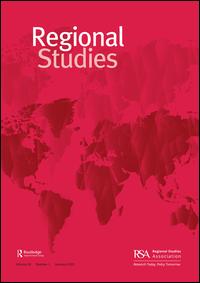
Do Diasporas Affect Regional Knowledge Transfer within Host Countries? A Panel Analysis of German R&D Collaborations
Interactive regional learning involving various actors is considered a precondition for successful innovations and, hence, for regional development. Diasporas as non-native ethnic groups are regarded as beneficial since they enrich the creative class by broadening the cultural base and introducing new routines. Using data on research and development (R&D) collaboration projects, the analysis provides tentative evidence that the size of diasporas positively affects the region’s share of outward R&D linkages enabling the exchange of knowledge. The empirical analysis further confirms that these interactions mainly occur between regions hosting the same diasporas, pointing to a positive effect of ethnic proximity rather than ethnic diversity.





